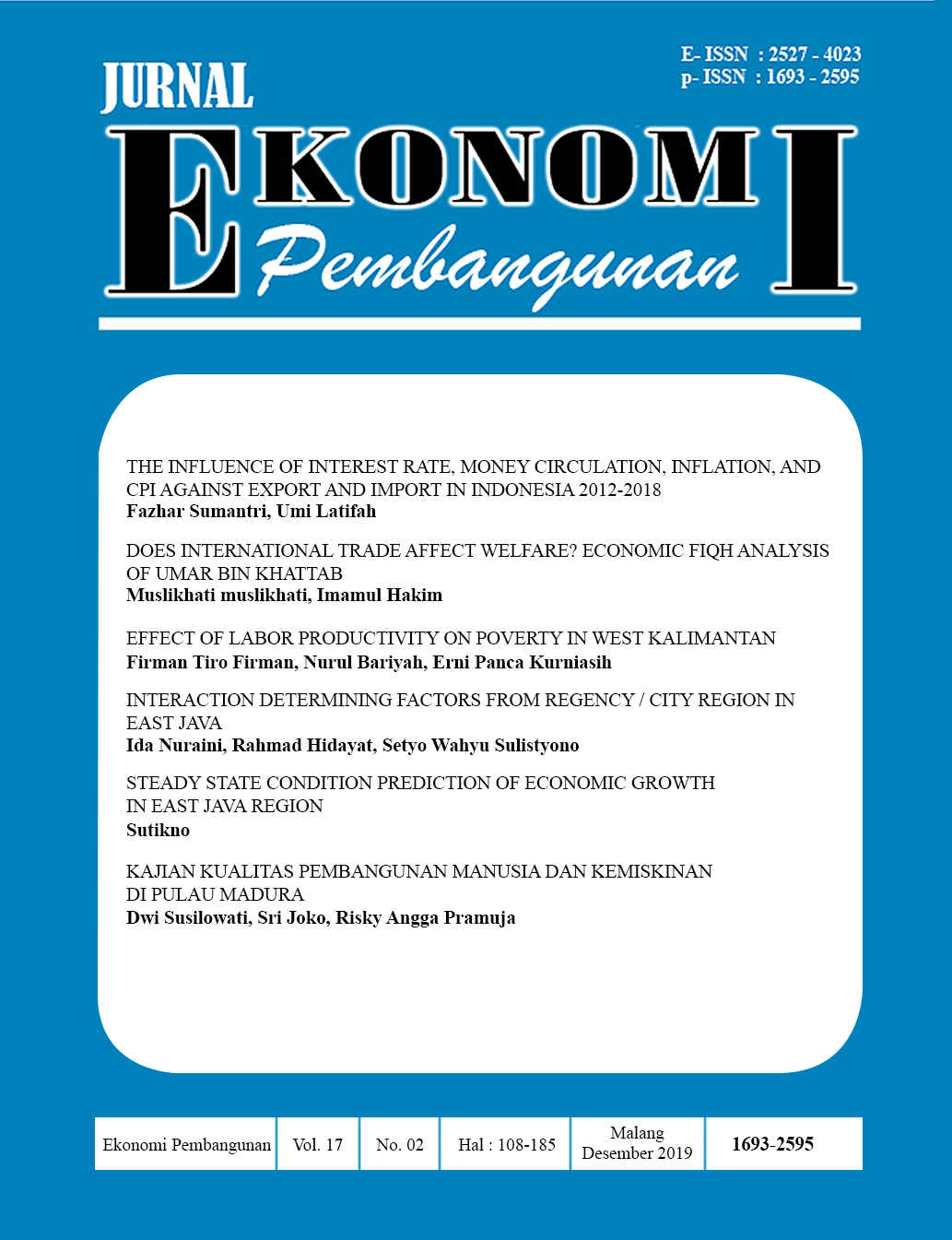QUALITY STUDY OF HUMAN DEVELOPMENT AND POVERTY IN MADURA ISLAND
DOI:
https://doi.org/10.22219/jep.v17i2.10360Keywords:
HDI, Poverty, Open Unemployment Rate, GRDPAbstract
This study aims to find out the most dominant factors and determine the districts in Madura that require special attention from the observed model so that it can provide benefits for policymakers, and the research method used is panel data with the OLS square approach. The results of panel data regression with the fix effect model show the results that the variables that have a positive and significant influence are the GRDP at a 5% confidence level in the GRDP variable with a positive direction while the open unemployment variable has a significant negative effect having a 6% confidence level with a negative direction. Variable consumption expenditure does not have a significant effect but has a positive direction. Intercept values differ in each district which shows the uniqueness of the model of the fixed effect. The highest intercept values were Pamekasan Sampang, Bangkalan and Sumenep. From the results of the HDI classification, the Sampang has a low classification of the district vocationally on Madura Island. The results of the classification of expenditure of basic and lowest consumption of staples in 2012 and 2018 were Pamekasan and Sumenep. The results of the classification of the highest open unemployment rates were in Bangkalan in 2012 and 2018. The lowest GRDP classification was in Pamekasan districts in 2012 and 2017.Downloads
References
Angelsen, A. (2006). Poverty And Inequality :, (2003), 1–20.
Eren, M., Çelik, A. K., & Kubat, A. (2014). Determinants of the Levels of Development Based on the Human Development Index : A Comparison of Regression Models for Limited Determinants of the Levels of Development Based on the Human Development Index : A Comparison of Regression Models for Limited Dependent Variables, (July). https://doi.org/10.5539/res.v6n1p10
Kuncoro, M. (2003). Ekonomi Pembangunan: Teori, Masalah, dan Kebijakan (ketiga). Yogyakarta: UPP AMP YKPN.
Kyswantoro, Y. F. (2016). Analisis Faktor Yang Mempengaruhi Human Development Index (Hdi) Pada 6 Daerah Tertinggal Di Pulau Jawatahun 2010-2016. JEP, 15, 113–128.
Mirza, D. S. (2015). Pengaruh Kemiskinan, Pertumbuhan Ekonomi, Dan Belanja Modal Terhadap Ipm Jawa Tengah. JEJAK: Jurnal Ekonomi Dan Kebijakan, 4(2), 102–113. https://doi.org/10.15294/jejak.v4i2.4645
N. Gregory Mankiw. (2010). Macroeconomics. Worth Publishers (7th ed., Vol. 7 ed). United States of America: Worth Publishers. Retrieved from http://irfanlal.yolasite.com/resources/N. Gregory Mankiw Macroeconomics%2C 7th Edition 2009.pdf
Shah, S., Banking, P., & Services, F. (2016). Munich Personal RePEc Archive Determinants of Human Development Index : A Cross-Country Empirical Analysis Determinants of Human Development Index : A Cross-Country Empirical Analysis, (73759).
Statistik, B. P. (2017). Provinsi Jawa Timur Dalam Angka 2017, 377. https://doi.org/0215-2193
Sulistyastuti, D. ratih. (2004). Dinamika Usaha Kecil dan Menengah (UKM) Analisis Konsentrasi Regional UKM di Indonesia 1999-2001. Jurnal Ekonomi Pembangunan, 9.
Suliswanto, M. S. W. (2010). Pengaruh Produk Domestik Bruto (Pdb) Dan Indeks Pembangunan Manusia (Ipm) Terhadap Angka Kemiskinan Di Indonesia. Ekonomi Pembangunan, 8(2), 357–366.
Susilowati, D., Sri, M., & Suliswanto, W. (2015). Manusia , Utang Luar Negeri Dan Kemiskinan ( Kajian Teoritis Di Indonesia ). Pertumbuhan Ekonomi, Indeks Pembangunan Manusia, Utang Luar Negeri Dan Kemiskinan (Kajian Teoritis Di Indonesia), 6, 89–106.
Pudjianto, B., & Syawie, M. (2015). Kemiskinan dan pembangunan manusia. (200), 231–246.
Wardana, D. P. (2016). Pengaruh Pembangunan Ekonomi Terhadap Pembangunan Manusia Di Kalimantan Timur. Ekonomi Keuangan, Dan Manajemen, 12(2), 179–191.
Widodo, T. (2006). Perencanaan Pembangunan-Aplikasi Komputer (1st ed.). Yogyakarta: UPP STIM YKPN YOGYAKARTA.
Zuhdiyati, N., David, D., & Faktor, K. (2015). Kemiskinan Di Indonesia Selama Lima Tahun Terakhir ( Studi Kasus Pada 33 Provinsi ). JIBEKA, 11 No. 2(Atalay), 27–31
Downloads
Published
Issue
Section
License
Authors who publish with Jurnal Ekonomi Pembangunan (JEP) agree to the following terms:
- For all articles published in Jurnal Ekonomi Pembangunan (JEP), copyright is retained by the authors. Authors permit the publisher to announce the work with conditions. When the manuscript is accepted for publication, the authors agree to the publishing right's automatic transfer to the publisher.
- Authors retain copyright and grant the journal right of first publication with the work simultaneously licensed under a Creative Commons Attribution-NonCommercial-ShareAlike 4.0 International License that allows others to share the work with an acknowledgment of the work's authorship and initial publication in this journal.
- Authors can enter into separate, additional contractual arrangements for the non-exclusive distribution of the journal's published version of the work (e.g., post it to an institutional repository or publish it in a book), with an acknowledgment of its initial publication in this journal.
- Authors are permitted and encouraged to post their work online (e.g., in institutional repositories or on their website) before and during the submission process, as it can lead to productive exchanges and earlier and greater citation of published work (See The Effect of Open Access).

This work is licensed under a Creative Commons Attribution-NonCommercial-ShareAlike 4.0 International License.






















